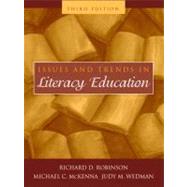
Preface.
Introduction to the Field of Literacy Education.
1. Balance.
Michael Pressley, Joan Rankin, and Linda Yokoi, A Survey of Instructional Practices of Primary Teachers Nominated as Effective in Promoting Literacy.
K. Au, J. Caroll, and J. Scheu, The Six Aspects of Literacy: A Curriculum Framework.
2. Phonics.
Steven A. Stahl, Ann M. Duffy-Hester, and Katherine Anne Dougherty Stahl, Everything You Wanted to Know about Phonics (But Were Afraid to Ask).
International Reading Association, Phonemic Awareness and the Teaching of Reading: A Position Statement from the Board of Directors of the International Reading Association.
3. Multicultural Diversity.
Jim Anderson and Lee Gunderson, Literacy Learning from a Multicultural Perspective.
Sandy Kaser and Kathy G. Short, Exploring Culture through Children's Connections.
4. Reading Assessment.
Robert J. Tierney, Literacy Assessment Reform: Shifting Beliefs, Principled Possibilities, and Emerging Practices.
D. Monty Neill, Transforming Student Assessment.
5. Literacy Materials.
The Commission on Reading, National Council of Teachers of English, Basal Readers and the State of American Reading Instruction: A Call for Action.
Constance Weaver, The Basalization of America: A Cause for Concern.
Patrick Groff, An Attack on Basal Readers for the Wrong Reasons.
6. Spelling.
Edward Miller, The Case of Invented Spelling: How Theory Becomes Target Practice.
Marcia A. Invernizzi, Mary P. Abouzeid, and Janet W. Bloodgood, Integrated Word Study: Spelling, Grammar, and Meaning in the Language Arts Classroom.
7. Emergent Literacy.
Linda Teran Strommen and Barbara Fowles Mates, What Readers Do: Young Children's Ideas about the Nature of Reading.
Judi Lucas Lesiak, Research Based Answers to Questions about Emergent Literacy in Kindergarten.
8. Content Literacy.
Richard T. Vacca, Let's Not Marginalize Adolescent Literacy.
Andrea M. Guillaume, Learning with Text in the Primary Grades.
9. Early Intervention.
Barbara M. Taylor, Barbara E. Hanson, Karen Justice-Swanson, and Susan M. Watts, Helping Struggling Readers: Linking Small-Group Intervention with Cross-Age Tutoring.
Billie J. Askew, Irene C. Fountas, Carol A. Lyons, Gay Su Pinnell, and Maribeth C. Schmitt, A Review of Reading Recovery.
10. Writing.
James V. Hoffman, Process Writing and the Writer's Workshop—Excerpt from When Bad Things Happen to Good Ideas in Literacy Education: Professional Dilemmas, Personal Decisions, and Political Traps.
Barbara Carney, Process Writing and the Secondary School Reality: A Compromise.
Jane Hansen, Evaluation: The Center of Writing Instruction.
Index.
The New copy of this book will include any supplemental materials advertised. Please check the title of the book to determine if it should include any access cards, study guides, lab manuals, CDs, etc.
The Used, Rental and eBook copies of this book are not guaranteed to include any supplemental materials. Typically, only the book itself is included. This is true even if the title states it includes any access cards, study guides, lab manuals, CDs, etc.